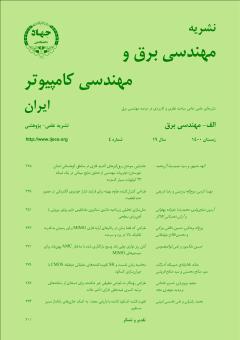تقویتکننده کسکود تاشده با بازیابی مجدد به کمک خازنهای راهانداز مسیر مستقیم
محورهای موضوعی : مهندسی برق و کامپیوتر
محمد رشتیان
1
*
![]() ,
علی خامسی نایینی
2
,
علی خامسی نایینی
2
1 - مرکز آموزش عالی هوانوردی و فرودگاهی کشور
2 - مرکز آموزش عالی هوانوردی و فرودگاهی کشور
کلید واژه: تقویتکننده کسکود تاشده بازیافته, تقویتکننده کسکود تاشده بازیافته بهبودیافته, فرکانس بهره واحد, نرخ چرخش, نویز معادل در ورودی,
چکیده مقاله :
در این مقاله یک تقویتکننده کسکود تاشده با بازیابی مجدد بر مبنای تقویتکننده کسکود تاشده بازیافته متداول ارائه شده است. عملکرد تقویتکننده پیشنهادی نسبت به تقویتکننده کسکود تاشده بازیافته مرسوم به طور قابل توجهی بهبود یافته است. در تقویتکننده پیشنهادی، منابع جریان طبقه خروجی تقویتکننده کسکود تاشده بازیافته که دارای مقدار ثابتی هستند مورد توجه قرار گرفتهاند و با ایجاد مسیری بین ورودی و خروجی به کمک اتصالات خازنی به منابع جریان پویا تبدیل شدهاند. بهره ولتاژ، پهنای باند، فرکانس بهره واحد و نرخ چرخش در توان برابر در مقایسه با تقویتکننده پیشین بهبود قابل توجهی یافته است. نتایج شبیهسازی با استفاده از شبیهساز HSPICE و با فناوری فایلهایnm CMOS 180نشان میدهد که بهره ولتاژ 6 دسیبل، نرخ چرخش 35% و پهنای باند تقریباً 30% نسبت به تقویتکننده کسکود تاشده بازیافته، افزایش و علاوه بر آن نویز معادل در ورودی نیز در حدود 36% کاهش یافته است. نرخ چرخش،توان مصرفی و بهره ولتاژ تقویتکننده بهبودیافته به ترتیب برابر 5/93 ولت بر میکروثانیه، 02/1 میلیوات و 3/68 دسیبل میباشد.
A double recycling Op-Amp based on a simple recycling folded cascode Op-Amp is presented. The proposed Op-Amp has significantly improved performance compared to a recycling folded cascode. In the proposed Op-Amp, those cascode output current sources of recycling folded cascode that still have a constant value have been considered and have taken on a dynamic state through capacitive couplings in the path created between the input and output of the amplifier. DC gain, unity-gain bandwidth, and slew rate have been improved compared to the previous amplifier at the same power consumption. Simulation results using the 0.18μm CMOS technology show a DC gain enhancement of 6dB, 35% improvement in slew rate, and almost a 30% increase the bandwidth compared to the traditional recycling folded cascode Op-Amp. Also, smaller input-referred noise is achieved. Simulated results of proposed circuit show the values of SR, power consumption and DC gain are about 93.5 V/µs, 1.02mW and 68.3 dB respectively.
[1] M. Akbari, "Single-stage fully recycling folded cascode OTA for switched-capacitor circuits," Electronics Letters, vol. 51, no. 13, pp. 977-979, May. 2015.
[2] O. Hashemipour and M. Akbari, "Enhancing transconductance of ultra-low-power two-stage folded cascode OTA," Electronics Letters, vol. 50, no. 21, pp. 1514-1516, Oct. 2014.
[3] P. Y. Kuo, G. J. Fan, and S. D. Tsai, "The enhancement of recycling folded cascode amplifier," in Proc. IEEE Int. Conf. on Consumer Electronics-Taiwan, ICCE-TW'16, 2 pp., Nantou, Taiwan, 27-29 May 2016.
[4] م. رشتیان، ا. هاشمیپور و ک. ناوی، "طراحی یک فیلتر پایینگذر چبیشف درجه چهارم سوییچ خازنی با ساختار انتگرالگیر خودصفرشونده در ولتاژ تغذیه 2/1 ولت،" نشریه مهندسی برق و مهندسی کامپیوتر ایران، سال 5، شماره 3، صص. 182-178، پاییز 1386.
[5] A. Mesri, M. Pirbazari, K. Hadidi, and A. Khoei, "High gain two-stage amplifier with positive capacitive feedback compensation," IET Circuits, vol. 9, no. 3, pp. 181-190, May 2015.
[6] R. S. Assaad and J. Silva-Martinez, "The recycling folded cascode: a general enhancement of the folded cascode amplifier," IEEE J. of Solid-State Circuits, vol. 44, no. 9, pp. 2535-2542, Sep. 2009.
[7] X. Zhao, H. Fang, T. Ling, and J. Xu, "Transconductance improvement method for low-voltage bulk-driven input stage," AEU-International J. of Electronics and Communications, vol. 49, no. C, pp. 98-103, Mar. 2015.
[8] G. Yosefi, "The high recycling folded cascode (HRFC): a general enhancement of the recycling folded cascode operational amplifier," AEU-International J. of Electronics and Communications, vol. 89, pp. 70-90, Jul. 2019.
[9] A. J. Lopez-Martin, et al., "Enhanced single-stage folded cascode OTA suitable for large capacitive loads," IEEE Trans. on Circuits and Systems, vol. 65, no. 4, pp. 441-445, Apr. 2018.
[10] R. Navidi, A. Fathi, K. Mohammadi, M. Mousazadeh, and A. Mousazadeh, "Improved gain folded cascode op-amp employing a novel positive feedback structure," in Proc. 27th Iranian Conf. on Electrical Engineering, ICEE'19, pp. 269-273, Yazd, Iran, 30 Apr.-2 May 2019.
[11] M. Rashtian and M. Vafapour, "Gain boosted folded cascode op-amp with capacitor coupled auxiliary amplifiers," International J. of Engineering, Trans. B: Applications, vol. 34, no. 5, pp. 1233-1238, May 2021.
[12] C. Garcia-Alberdi, A. J. Lopez-Martinez, L. Acosta, R. G. Carvajal, and J. Ramirez-Angulo, "Tunable class AB CMOS Gm-C filter based on quasi-floating gate techniques," IEEE Trans. on Circuits and Systems, vol. 60, no. 5, pp. 1300-1309, May 2013.
[13] M. Rashtian, O. Hashemipour, and A. M. A. Hemmatyar, "A simple time domain approach to noise analysis of switched capacitor circuits," IEICE Electronics Express (ELEX), vol. 7, no. 11, pp. 745-750, May 2010.
[14] M. Rashtian, A. M. A. Hemmatyar, and O. Hashemipour, "A new simple method for analysing of thermal noise in switched capacitor filters," International J. of Electronics, vol. 99, no. 12, pp. 1739-1752, 2012.
[15] S. Liu, Z. Zhu, J. Wang, L. Liu, and Y. Yang, "A 1.2-V 2.41-GHz three-stage CMOS OTA with efficient frequency compensation technique," IEEE Trans. on Circuits and Systems I, vol. 66, no. 1, pp. 20-30, Jan. 2019.
[16] P. Y. Kuo and S. T. Tsai, "An enhanced scheme of multi-stage amplifier with high-speed high-gain blocks and recycling frequency cascode circuitry to improve gain-bandwidth and slew rate," IEEE, vol. 7, pp. 130820-130829, 2019.
[17] B. Razavi, Design of Analog CMOS Integrated Circuits, 2nd Ed. New York, NY, USA: McGraw-Hill, 2017.

